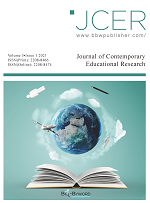Abstract
This research focused on the social concern of college students’ participation in physical exercise and mobile phone dependence. The research model and hypotheses in this study were constructed based on the self-control theory and by reviewing previous research. This research distributed questionnaires to 207 college students from a university in Guangzhou, China to obtain relevant data. Mediation analysis was employed to test the four hypotheses drawn from empirical and conceptual research. The results of this research showed that first, the longer the exercise duration of college students, the higher the level of their self-control, thus exercise duration has a significant positive impact on self-control. Second, increasing the exercise duration of college students had no effect on their mobile phone dependence. Third, the higher the level of self-control, the lower the dependence on mobile phones, thus signifying that self-control has significantly negative impact on mobile phone dependence. Fourth, self-control plays a mediating role in the effect of exercise duration on mobile phone dependence. In conclusion, the longer the exercise duration of college students, the higher the level of self-control, in which it is able to significantly reduce the dependence on mobile phones.
References
China Internet Network Information Center (CNNIC), 2021, The 47th Statistical Report on China’s Internet Development. CNNIC (updated February 2021).
Fu X, Lin Y, 2019, Studying the Negative Effects of Mobile Phone on Users’ Health: A Large-Scale Survey of College Student. Documentation, Information & Knowledge, (02): 120-9.
Zhong W, Wang Y, Zhang G, 2020, The Impact of Physical exercise on College Students’ Mobile Phone Dependence: The Mediating Role of Self-Control. International Journal of Mental Health and Addiction, : 1-16.
Zhu G, 2017, Study on the Intervention of Physical Exercise on College Students’ Tendency of Mobile Phone Addiction. Zhejiang Sport Science, 39(5): 90-7.
Bu Y, 2014, Effect of Physical Exercise on College Students’ Mobile Phone Addiction. Modern Preventive Medicine, 41(7): 1242-4.
Liu H, 2012, Strengthen Physical Exercise and Promote Students’ Mental Health. Journal of Changchun Education Institute, (22): 108-9.
Zhang Z, Zhu F, Cai X, 2018, Mediation Role of Self-Control in the Association between Physical Exercise and Aggressive Behavior among College Freshmen. Chinese Journal of School Health, 39(07): 1037-40.
Schöndube A, Bertrams A, Sudeck G, et al., 2017, Self-Control Strength and Physical Exercise: An Ecological Momentary Assessment Study. Psychology of Sport and Exercise, 29: 19-26.
Myrseth K, Fishbach A, 2010, Self-Control: A Function of Knowing When and How to Exercise Restraint. Current Directions in Psychological Science, 18(4): 247-52.
Li Y, Jin L, Zhang S, 2016, Research on the Relationship between Self-Control Ability and Mobile Phone Dependence among University Students. Chinese Journal of Health Education, 32(9): 775-8.
Zhang C, Zhai L, Wang C, 2017, Mediating Effect of Self-Control on the Relationship between Mobile Phone Dependence and Academic Procrastination in College Students. China Journal of Health Psychology, 25(1): 145-8.
Zhu F, Zhou C, Wang B, 2014, Physical Exercise Decreases the Smoking Dependence of College Students: Mediation Effect of Self-Control. Sports & Science, (6): 109-13.
Giner-Sorolla R, 2001, Guilty Pleasures and Grim Necessities: Affective Attitudes in Dilemmas of Self-Control. Journal of Personality and Social Psychology, 80(2): 206.
Walsh P, White M, et al., 2008, Dialing and Driving: Factors Influencing Intentions to Use a Mobile Phone While Driving. Accident Analysis & Prevention, 40(6): 1893-900.
Hayes AF, 2013, Introduction to Mediation, Moderation, and Conditional Process Analysis: A Regression-Based Approach, The Guilford Press, New York, 76-86.
Guay F, Vallerand J, Blanchard C, 2000, On the Assessment of Situational Intrinsic and Extrinsic Motivation: The Situational Motivation Scale. Motivation and Emotion, (24): 175-212.
